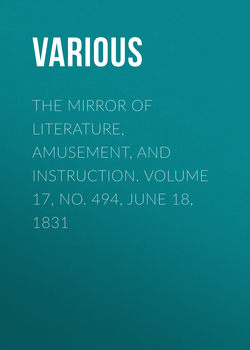Читать книгу The Mirror of Literature, Amusement, and Instruction. Volume 17, No. 494, June 18, 1831 - Various - Страница 4
EXETER HALL, STRAND
POPULAR SUPERSTITIONS
Оглавление(For the Mirror.)
All power of fancy over reason is a degree of insanity.—JOHNSON.
In a former number I gave some observations on apparitions, and I shall here continue my remarks.
The argument that was used by Dr. Johnson was founded on premises that are as inadmissible as his conclusion, viz. that the popular opinion in favour of the reality of apparitions could only obtain universal credence by its truth. This is very plausible, but destitute of foundation. Does the learned doctor mean to deny the universality of errors? does he mean to call the whole body of the learned and enlightened cavillers? and that because they are not willing to consent to his monstrous opinion? To reverse the argument, does he mean to deny the truth of the Scriptures, or is he bold enough to assert that they have received universal credence? So much for the arguments wielded by Dr. Johnson, who has not been unaptly termed the Colossus of Literature. The idea that departed spirits revisited the earth, probably took its rise from the opinion of the immortality of the soul, which was very general in both ancient and modern times.2 This supposition is most consonant with probability. It is always to be remarked that this species of superstition is most prevalent in those countries where learning and reason have made but little progress. The demons [Greek: Daimones] and genii of former times were exactly the same as the ghosts of this; the same attributes, the same power, and the same malice were observed of one, as are now attributed to the other. By the Chaldeans these demons were divided into two kinds, good and bad. But as it is foreign to my purpose to enter into an investigation of the opinions of the ancients on this subject, I shall content myself with referring the curious reader to Stanley's History of Philosophy, a deservedly popular work.
I shall here recount one of the most extraordinary tales relating to this subject that I ever heard; I believe the solution is evident, and I am not aware that it has appeared before; but if it has, some of the readers of the Mirror may not have seen it.
A surgeon of Edinburgh was confined to his bed by some illness, and at "the dewy hour of eve," when the room was lighted by nothing but the glimmering and flickering light of a wood fire, he perceived a female sitting at the foot of the bed clothed in white! Imagining that it was some defect in his sight, he gazed more intensely at it, still it was there. He then raised his hand before his eyes and he did not perceive it; on withdrawing it the apparition was there. Closing his eyes he went through a mathematical calculation to convince himself he was in his right senses; upon reopening them he still perceived her there. The fire then went out and he saw no more. I confess I see no difficulty in accounting for this, by supposing the gentleman was afflicted with that horrid disease of which Sir Walter Scott gives many cases in his Demonology and Witchcraft. Although I have no warrant for asserting spirits do not return, yet I must say, all the tales I have ever heard do not necessarily require any such interpretation on them. It may be true, and so may everything which we have no evidence against or for. If my opinion on the subject was to be shaken by anything, it would be with the following story, which was given to me by one whose veracity I have no reason to doubt.
There is, or rather was, a very ancient castle in Lancashire, near Liverpool, called Castle de Bergh, which belongs to a noble family of that name. Many years ago the possessor of the castle, Mr. de Burgh, died, and the castle was then let out to various of the tenantry, among whom was a carpenter. Two years after the death of Mr. de Burgh, as this carpenter was employed in his workshop, about a quarter of a mile from the castle, melting glue, it being evening, and only four of his men with him, he perceived a gentleman in mourning passing the lathe where the men were at work. He was immediately seized with a violent trembling and weakness, his hair stood on end, and a clammy sweat spread over his forehead. The lights were put out, he knew not how, and at last, in fear and terror, he was obliged to return home. On his arrival at the castle, as he was passing up the stairs, he heard a footstep behind, and on turning round he perceived the same apparition. He hastily entered his room, and bolted, locked, and barred the door, but to his horror and surprise this offered no impediment to his ghostly visiter, for the door sprang open at his touch, and he entered the room! The apparition was seen by various others, all of whom asserted it bore the strongest resemblance to their deceased master! One gentleman spoke to him, and the spirit told him "that he was not happy."
Foley Place.
AN ANTIQUARY
2
It must not be supposed that the opinion on the immortality of the soul was confined either to Christians or Jews; according to Herodotus, (lib. 2) the Massagetae believed in the immortality of the soul; the most eminent of the ancient philosophers invariably advocated that doctrine, one of the most important in the Christian's Creed.
